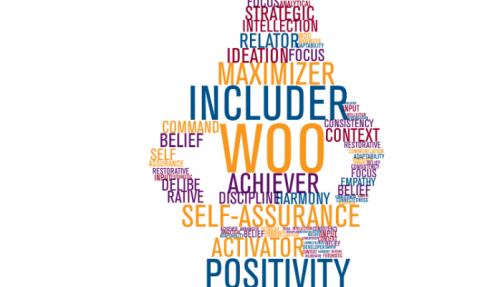
I loved super heroes when I was a kid. My favourites were the Wonder Twins. They were a brother and sister mutant duo from the planet Exxor who helped out the Super Friends.

I thought they were cool because they could turn themselves into almost whatever they wanted to be. All they had to do was put their fists together and say, “Wonder Twin powers, activate! …Form of __________.” Then they would become whatever they said. Zan, the boy, could morph into any form of water, and Jayna could become any animal. Their super powers really made me jealous.
Having the ability to turn yourself into whatever you want would certainly be amazing, but unfortunately our human super powers aren’t like that. We get a limited number of them, some stronger than others, and then we’re pretty much stuck with them for the rest of our lives.
I’ll get into why in a few moments.
Do you have the opportunity to live your strengths every day?
In Part 1 of this series, “Why you MUST Discover Your Strengths,” I made the case that knowing how you’re wired, and what you have the potential of becoming one of the best in the world at, is crucial. A deeper self-awareness helps us know how to improve ourselves, it empowers us to foster authentic and enjoyable relationships, and it equips us to work better with others in a team.
I also introduced you to StrengthsFinder, the most valuable tool I’ve come across to better understand my talents and those of whom I’ve aligned myself with. I was first exposed to it about ten years ago. I had taken other personality tests before, but nothing helped me like this one to tap into the deep mental hardwiring of my identity.
In creating the StrengthsFinder assessment, the Gallup Organization interviewed two million people from all walks of life, and from all over the world. They were asked a series of questions about their work and what they believed made them successful. One of the key questions they were asked was…
"At work do you have the opportunity to do what you do best, most of the time?"
Only 17 percent said yes; 83 percent say no.
Think about how much wasted productivity that represents. Even worse, think about how unfulfilling of a life most people must be living. Every day they go to work, squeezed into a role where they’re not free to live their strengths, and not able to do what ultimately brings them the greatest joy and satisfaction.
That’s no way to live.
The Gallup Organization set out to boost productivity by helping people better understand how they are wired. From their research, they came up with 34 different talent themes, or potential strengths, that cover the full range of human ability. Everyone has some combination of three to five of these 34 talents as their most dominant characteristics.

You can download a PDF that describes all 34 of the StrengthsFinder themes here.
One quick side note before I move on… These are talents, or potential strengths, but not necessarily fully developed strengths. Your top talent themes describe your unique process of thinking, feeling, and acting. That’s all. You’ll need to do a little work to turn them into actual strengths. I’ll share more on that in a future post.
Three Key Assumptions of the Neuroscience Behind StrengthsFinder
1. Your talents are unique.
What do I mean by unique? Quite simply, no one else has the exact same talent mix that you have. No one else in history, no one else alive today, and perhaps even no one ever to be born in the future has had / does have / or will have an identical way of thinking, feeling, and acting as you do.
That means that there are things that you have the capacity to do that no one else in the world can do. We might call these your unique superpowers. They are truly YOURS, and ONLY yours.
Let me explain.
Statistically, only one in 33.4 million people share the exact order of your top five most dominant talents. Remember, there are 34 different possible themes. Here’s the math:
34 x 33 x 32 x 31 x 30 = 33,390,720
So where I live, in Australia, we have a population of 23 million people. It’s statistically likely that no one else in my country, if they were to take the StrengthsFinder assessment, would produce the same top five results in the same order of dominance as me.
If you live in the United States, it’s statistically likely that there are around 9 other people that would share the exact order of your top five talent themes.
If we keep the math going, most likely, no one else alive today, nor in the past, nor whom will be born in the next four or five generations, shares the exact order of your top seven most dominant themes.
You are truly unique.
2. Your talents are enduring
What does enduring mean? Your core, most dominant talents do not change over time. They are hard-wired into your neural makeup. Who you are has for the most part been fully established by 9 years of age.
Your character may change. Your knowledge and skills will change. But the hard-wiring of your talents do not.
How are our talents formed?
Depending on your worldview, you’ll consider the first cause of your talents to be either God or chance. Either way, when it comes to the formation of our neural pathways, there is some combination of nature and nurture. In some way, both your genetics and your early childhood environment led to the formation of your unique and enduring talents.
I certainly don’t claim to be a neuroscientist or psychologist, but let me break down for you what I understand about the formation of our neural pathways from conception to adulthood. Don Clifton lays much of this out in his book Now, Discover Your Strengths.
From Conception to 42 Days
Forty-two days after conception your first neuron was formed; just one solitary brain cell. That one cell begins to divide, as do all others formed, and four months later, you had 100 billion neurons.
From 60 Days Pre-Birth
Sixty days before birth, your neurons began to form synapses, or connections between neurons over which electric impulses flow. This is how brain cells communicate.
By the Toddler Years
By age 3, each of those 100 billion brain cells has formed about 15,000 synapses. That’s 1500 trillion connections; a lot of brain cell communication!
At this point, a child has so much data flowing through their brain that they struggle to make sense of the world. This could explain why as a parent of small children you may have encountered something like this:

This is where the brain needs to begin to specialize and choose which pathways are the most efficient in processing information. Environment likely plays a significant role here. The synapses that are most used get stronger and “wider” while the neglected pathways begin to die off.
As a result, some neural connections become like super highways. Just like a sixteen-lane super highway can handle a lot of traffic, dominant neural pathways can carry a lot of information.

Other neural pathways look more like an overgrown path.

This is a helpful metaphor for understanding why some talents are more dominant than others, and why some seem to be completely non-existent. It explains why we have both strengths and weaknesses.
As I shared in my last post, empathy for me is like an overgrown path. I’ve been able to chop through some of those vines and widen the path a little, but it will never become a super highway.
By Age Nine
The majority of this process of specializing takes place before age 9, and is nearly completely finished by age 15. By age 22, the process is complete.

Here’s an interesting fact. The Gallup Organization studied and tested numerous identical twins and found no statistical commonality of talent themes. Although they have the exact same DNA and very similar environmental upbringings, there seem to be other forces at work leading to the hardwiring of talent themes.
All of that leads to a final conclusion…
3. We improve by focusing on strengths, not weaknesses.
Our talents and subsequent strengths exist because there are neural pathways in the brain that are more efficient and over which more information will naturally flow. Our most dominant talents are a result of the super highways in the brain, and our weaknesses are a result of the overgrown paths.
If I desire to become more empathetic, I must face the fact that although I can learn to become a little better at understanding how I might make other people feel, I’m never going to be as empathetic as my wife. She has an Empathy super highway. I have a slightly cleared pathway.
Seeking to convert my Command theme, or one of my other four dominant themes, into a strength would be a much more efficient use of my time and energy. I shouldn't waste too much time trying to re-wire my brain. It might be possible to turn a dirt path into a super highway given enough time and effort, but at what cost?
We do need to find ways to manage around our weaknesses, but our shortcomings should never be the focus of our personal growth. I find that this is very counterintuitive for most people, because society seems to pressure us to get rid of weaknesses and become more well-rounded individuals.
I’ll go over some strategies for managing around weaknesses in a future post.
So how about you?
Do you have the opportunity to do what you do best, most of the time?
Do you know what you have the potential of becoming one of the best in the world at?
Leave a comment below to share your thoughts.
Why not take the StrengthsFinder assessment yourself?

Anyone can purchase access to the 100-question StrengthsFinder assessment for only $15. It also comes with a digital copy of the book StrengthsFinder 2.0, which gives an introduction to the program and explains each of the 34 talent themes.
Here’s the link: https://www.gallupstrengthscenter.com/Purchase/en-US/Product
If you do decide to take the assessment and you’d like some feedback or have any questions, please send me a private message on steemit.chat. I’d love to connect and help you any way I can.
Follow me to catch the next three posts in this series.
This weekend, I meet with a group of property investors in Sydney and Melbourne. Several times per year I host these one-day gatherings so I can connect face-to-face with those I am mentoring. In the afternoon sessions, I am facilitating a strengths-development training. The aim is to apply StrengthsFinder to the world of property investing. Many of those I’ve mentored in the past have said that this was one of the highlights of the work we did together.
As I’ve been preparing this week for the upcoming training day, I decided to package some of what I’ll be saying into this series of posts to share with you. I hope you enjoy them and find them beneficial.
Here are the upcoming posts:
- Unleash Your Super-Power, Part 3: How to Live Your Strengths
- Unleash Your Super-Power, Part 4: How to Deal with Weakness
- Unleash Your Super-Power, Part 5: Building Strong Team Relationships
And if you missed Part 1, here’s the link:
Recommended Reading
First, Break All The Rules: What the World's Greatest Managers Do Differently, by Gallup Press
Now, Discover Your Strengths, by Marcus Buckingham and Donald O. Clifton
Go Put Your Strengths to Work: 6 Powerful Steps to Achieve Outstanding Performance, by Marcus Buckingham

@jasonstaggers
image credits: brain, wonder twins, 34 themes, synapse, toddler, highway, overgrown path, twins
I will vote for anything with the wonder twins!
Downvoting a post can decrease pending rewards and make it less visible. Common reasons:
Submit
Haha! How could you not! :)
Downvoting a post can decrease pending rewards and make it less visible. Common reasons:
Submit
This post has been linked to from another place on Steem.
Learn more about linkback bot v0.4. Upvote if you want the bot to continue posting linkbacks for your posts. Flag if otherwise.
Built by @ontofractal
Downvoting a post can decrease pending rewards and make it less visible. Common reasons:
Submit
This is a great post man!!! Just loved the reading. Keep sharing and Keep sharing more @jasonstaggers
Downvoting a post can decrease pending rewards and make it less visible. Common reasons:
Submit
Thanks @funnyman! Appreciate the encouragement. I've enjoyed keeping up with you as well.
Have you ever taken the StrengthsFinder assessment or anything like it?
Downvoting a post can decrease pending rewards and make it less visible. Common reasons:
Submit
Nope!!!!
Downvoting a post can decrease pending rewards and make it less visible. Common reasons:
Submit
Great post, Jason! Strength finders is a great platform to begin thinking differently about what brings success. Good stuff.
Downvoting a post can decrease pending rewards and make it less visible. Common reasons:
Submit
Thanks Luke. Have you used it at all in your business? The StrengthsFinder terminology has become for me the primary way I understand the people I work with.
Downvoting a post can decrease pending rewards and make it less visible. Common reasons:
Submit
We've talked about it now and again but haven't yet done it with everyone. Might be a good time to revisit that. With a fully remote team from multiple cultural backgrounds, we have a lot of differences we work through already. Also, our team is pretty small, but I still think this could help. It's been a while since I took it also. Two of my five strengths changed between 1.0 and 2.0 the last time I took it. I wouldn't be surprised if some changes have happened again considering my world view shifts over the last few years.
Downvoting a post can decrease pending rewards and make it less visible. Common reasons:
Submit
That would be interesting to see if there is any change. It's not unusual for one nor two of your top five to be different on a second take. Apparently most people have three dominant themes and two supporting themes. The three that remained were likely more dominant. The supporting themes were probably still in your top ten if you were to get the full 34 theme report. That was the case on my second take.
But that said, there could always be some human error in the responses. While I buy into the enduring, hard-wiring aspect of our neural makeup, it's difficult to be precise with a subjective psychometric.
According to Gallup' research, the accuracy of the test diminishes when you take it a second or third time. 97.5% accuracy rating the first time, 89.9% second time. Not sure how valid that is.
Keep me posted. It'd be cool to hear your results.
Downvoting a post can decrease pending rewards and make it less visible. Common reasons:
Submit
Heh. The accuracy decreases. That's kinda funny, when you think about it. "This subjective thing gets less accurate the more you look closely at it, do it multiple times and think too much about the results." Heheh. I'm a fan of neural plasticity, so I'm not super convinced on the hard-wiring part. But yeah, I should take it again sometime. I'll let you know if I do. I took a Myers Briggs thing recently and was surprised to see it change up a bit also.
Downvoting a post can decrease pending rewards and make it less visible. Common reasons:
Submit
I'll need to study up on neural plasticity. There's no doubt there's some validity but I suppose its a question of how much can be changed with how much effort. Fascinating stuff though. The human brain is amazing.
Downvoting a post can decrease pending rewards and make it less visible. Common reasons:
Submit